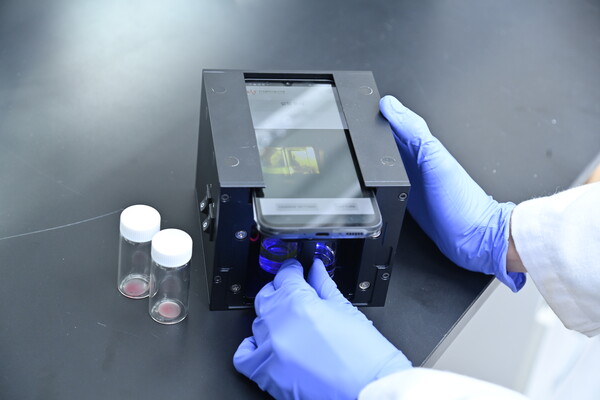Researchers at the Korea Institute of Science and Technology (KIST) have developed a user-friendly bladder cancer diagnostic kit for home use. The kit can detect bladder cancer biomarkers in urine with high accuracy without requiring any pre-treatment of the sample.

Bladder cancer has a cure rate of over 90 percent when detected early, but its recurrence rate of 70 percent necessitates ongoing monitoring. Late-stage diagnoses often lead to major surgeries, such as bladder removal, artificial bladder implantation, or reliance on urine bags, significantly reducing quality of life.
Current diagnostic methods, including low-sensitivity urine tests and invasive cystoscopy, highlight the need for simpler and more accurate diagnostic technologies.
The diagnostic kit, developed by Professors Jeong Young-do of the Center for Advanced Biomolecular Recognition at KIST and Kang Seok-ho of the Department of Urology at Korea University School of Medicine, uses the principle of oil-water layering to detect biomarkers. Conventional urine tests struggle with low biomarker concentrations and interference from impurities like hematuria.
The new kit addresses these challenges by utilizing a mechanism in which biomarker-bound films are disrupted, releasing buoyant signal carriers that travel through an oil layer to generate detectable signals. The approach eliminates interference from impurities while amplifying signals, enabling precise detection of bladder cancer biomarkers.
In clinical trials involving 80 bladder cancer patients and 25 healthy individuals at Korea University Medical Center, the kit demonstrated a sensitivity of 88.8 percent.
The team stressed that the results are a substantial improvement over the 20 percent sensitivity of existing diagnostic methods. Notably, the new kit effectively detected early-stage bladder cancer, which traditional methods have struggled to identify.
The team also stressed that the non-invasive and user-friendly diagnostic method represents a significant advancement in bladder cancer detection. By reducing the need for invasive cystoscopy, the kit could improve survival rates and protect patients’ quality of life.
The researchers plan to commercialize the kit through a startup named Float Biosciences. Selected as a preliminary team in the 2024 NST Convergence Startup Challenge, the startup aims to scale production for broader availability.
“This simple diagnostic kit can significantly reduce the need for unnecessary cystoscopy and enable early detection of bladder cancer,” Jeong said.
Kang also said, “The collaboration between KIST and Korea University demonstrates the potential to develop diagnostic technologies for a wide range of diseases.”
The results of the research were published in Nature Biomedical Engineering.
Related articles
- Merck Biopharma's Bavencio changes urothelial carcinoma treatment paradigm in Korea
- [Column] Can’t bladder cancer patients treat disease without removing their bladders?
- Keytruda-Padcev combo approved for 1st-line treatment of locally advanced/metastatic urothelial carcinoma
- [Column] ‘I've already had surgery for bladder cancer. You say I need another one?’
- Edgecare’s wearable ultrasound for bladder monitoring wins Korea nod

